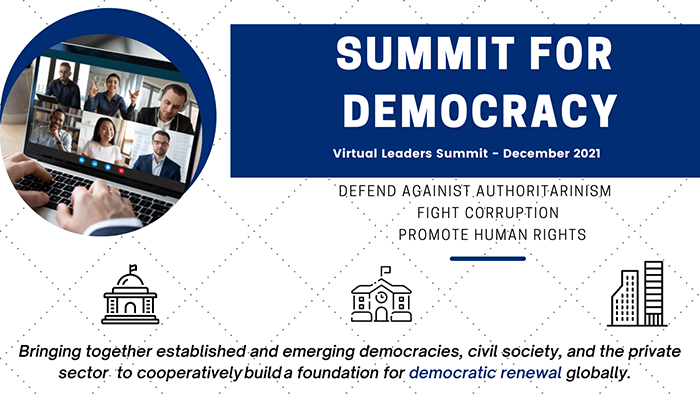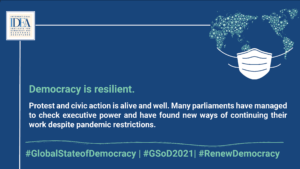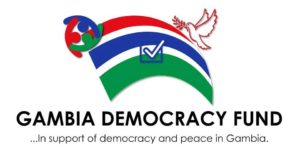
Screengrab
The Biden administration has seemingly made a decision to err on the side of inclusiveness, as several states guilty of undermining democracy (Poland, the Philippines, India) have found themselves on the invitation list to the Summit for Democracy, notes J. Brian Atwood, a visiting scholar at Brown University’s Watson Institute.
This approach is borne out by the experience of the National Democratic Institute (NDI) which, funded largely by the U.S. Agency for International Development and the National Endowment for Democracy (NED), has taken its cue from democrats on the ground, he writes for The Hill:
In some cases, NDI has maintained arms-length, diplomatic relationships with authoritarian governments and/or ruling political parties. This has facilitated exploiting even the smallest openings for democratic change. This approach has become more difficult over time, and NDI has been expelled from a few fast-closing authoritarian governments.
But democracy is best promoted in the open air, adds Atwood, former NDI president from 1985 to 1993 and USAID administrator from 1993 to 1999. Sharing the nuts and bolts of democratic practice and its value principles should not be done in the dark.
Biden’s democracy summit must cast a wide, inclusive net https://t.co/aWhCkZv2cc
— Democracy Digest (@demdigest) November 22, 2021
Democracies have started closing ranks in a geopolitical landscape shaped by competition, according to a new analysis. Meanwhile, the pandemic has weakened democracy in 80 countries, meaning that 34% of the world’s population lives in states where democracy is deemed to be in decline.
The transition to a geopolitical landscape shaped by competition is now a fact, when it was merely an expectation in 2019, notes Florence Gaub, Deputy Director of the EU Institute for Security Studies (EUISS). While relations between China and the US have continued to deteriorate – fueled by Chinese cyber-attacks, disinformation campaigns and strong language – EU-US transatlantic relations appear more stable, she writes in ‘Global Trends to 2030,’ a report for the European Strategy and Policy Analysis System (ESPAS).
 States begin to coalesce around visions for the future: many, though not all, democracies rally around the United States; those pushing for an alternative system gravitate towards China and Russia. Many, however, still hope to navigate between the two rivals. Moreover, while during the Cold War there was almost no connectivity between the two blocs, today competing global visions are tempered by strong economic, technological, and logistical connections, not only between the two ‘majors’ but also in the tangled network of other key actors.
States begin to coalesce around visions for the future: many, though not all, democracies rally around the United States; those pushing for an alternative system gravitate towards China and Russia. Many, however, still hope to navigate between the two rivals. Moreover, while during the Cold War there was almost no connectivity between the two blocs, today competing global visions are tempered by strong economic, technological, and logistical connections, not only between the two ‘majors’ but also in the tangled network of other key actors.
‘Connectivity wars’ challenge the democratic world by the use of all available means other than war to inflict damage or extort concessions, Gaub adds. Interdependence by way of connectivity raises the question of conflict and conflict resolution at a time of interdependence. RTWT
A major indicator of democracies ‘closing ranks’ is the forthcoming, much-anticipated Summit for Democracy.
But that event cannot simply be a talking shop for global heads of state, argues Jeffrey Smith, the founding director of the pro-democracy nonprofit Vanguard Africa. When elected leaders fail to match their pro-democracy rhetoric with action, it is civil society activists who often hold them accountable and push them toward needed reform. Civil society must therefore be given the opportunity to participate in the official proceedings as equal stakeholders, he writes for Foreign Policy:
And in those instances where a country representative is not invited due to a lack of democratic credentials, invitations should be extended to vetted pro-democracy opposition leaders, those who quite often put their lives on the line to advance social change at home. Unfortunately, inviting only elected leaders seems to be the plan of action so far. But especially for a summit held largely online, it’s not too late to open the door to others—and to countries left off the initial list.
 One glaring omission on the invite list is Gambia, where In 2016, civil society leaders, human rights activists, and beleaguered political opposition joined forces to defeat one of the continent’s longest-ruling, most ruthless dictators in a hugely momentous election, Smith adds. RTWT.
One glaring omission on the invite list is Gambia, where In 2016, civil society leaders, human rights activists, and beleaguered political opposition joined forces to defeat one of the continent’s longest-ruling, most ruthless dictators in a hugely momentous election, Smith adds. RTWT.
The summit is an opportunity to generate democratic renewal and affirm democracies’ resilience, observers suggest.
But its geopolitical ambitions are bound to disappoint, argues Thomas Pepinsky, a Nonresident Senior Fellow at Brookings’ Center for East Asia Policy Studies:
- To see why, it helps to distinguish between a country’s political regime and its foreign policy objectives. As Jessica Chen Weiss and I recently argued in Foreign Affairs, Chinese foreign policy is fundamentally goal-oriented and pragmatic rather than ideological….. China’s most important strategic rival in the South China Sea region is Vietnam, which is itself a single-party authoritarian regime just like China…… Russia, like China, can find common cause with any regime — democratic or authoritarian — whose policy stance is compatible with its perceived national interest….
- A second reason why the Summit for Democracy may prove ineffective is that it is not responsive to the general issues of governance and economic performance that matter for mass publics around the world. Even if it were true that democracies are more likely to deliver sustained economic growth or more equitable societies — and the evidence on this is far from decisive — cases like Singapore since 1965, China since 1978, and Vietnam since 1986 demonstrate that there do exist authoritarian models for rapid economic growth and widely-shared improvements in material wellbeing.
This ought to be the summit’s focus, Pepinsky contends: identifying threats to democracy and ways to strengthen existing regimes by investing in freedoms of conscience, mobilization, and dissent for all.







